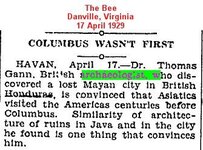Nick in NEPA
Sr. Member
- Dec 28, 2006
- 297
- 4
- Detector(s) used
- Bounty Hunter Tracker IV
- Primary Interest:
- All Treasure Hunting
Re: Was Columbus the First Explorer to Visit the Americas? The Evidence Says NO
These look like they may be faked, but here's some more. Click on 'link' at the end of the paragraph under the picture. The King Arthur is quite interesting. http://www.ourstrangeworld.net/?p=7247
These look like they may be faked, but here's some more. Click on 'link' at the end of the paragraph under the picture. The King Arthur is quite interesting. http://www.ourstrangeworld.net/?p=7247









